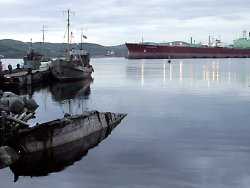Impact beyond the EU
Insurers should paralyze Russia’s oil exports
May 4, 2022, 4:55 p.m
With its new sanctions package, the EU not only wants to stop its own oil imports from Russia. The proposal contains a provision that is intended to restrict trade with other countries in a roundabout way. This makes it difficult for the Kremlin to find replacements for the lost customers.
By far the largest oil customer in Russia is closing. The EU Commission wants to end the import of Russian crude oil and oil products such as diesel into the member states by the end of this year. Only Hungary and Slovakia have made exceptions. This is already a severe blow to the Russian treasury, which is ultimately also used to finance the war in Ukraine. More than half of Russia’s energy export earnings totaling over 60 billion euros in the first two months of the war came from Europe. Other countries, including the USA and Great Britain, have already decided on such an import ban. What could make the draft EU resolution particularly painful for Russia, in addition to the import ban that has been hotly debated for months, are other provisions that not only affect oil companies, but also banks and insurance companies.
An EU import ban could be thwarted if other states that have not joined the Western sanctions simply buy Russian oil, possibly with a certain discount. China and India in particular are repeatedly mentioned. If the price on the global oil market rises high enough – not least due to the EU embargo – it could even make up for the falling sales of the Russian oil industry. Even in recent months, when oil exports have already been declining, Russia’s revenues from oil and gas sales have actually increased.
It is true that some oil companies have already withdrawn from all transactions in and with Russia, either on their own initiative or under pressure from the public, and some banks no longer want to finance business with Russia. This has contributed to the fact that the price of Russian Urals oil on the world market has fallen far below the – albeit very high – price of the western varieties Brent and WTI. Over time, however, Russia could further increase its exports to third countries.
Greece has the largest fleet
The EU wants to prevent this with an inconspicuous but far-reaching provision in its sanctions decision. Because as well as buying Russian oil, it should also be prohibited for any person or company covered by EU law to provide “directly or indirectly technical assistance, brokerage services, financing or financial assistance or any service related to transport, including in the form of ship-to-ship transfer, of Russian crude oil or petroleum products originating in or exported from Russia”.
Provided the EU states agree to the Commission proposal, this tapeworm sentence is intended to ensure that oil exports from Russia are actually drastically curtailed. Because in many areas, from ship financing to insurance and shipowners, companies from EU countries or institutions that are subject to EU law play an important role. Greek shipowners have the world’s largest fleet of oil tankers. Many banks involved in the business are based in the EU.
Insurers are also indispensable for oil transport and for all shipping traffic on the seven seas. Hardly any country in the world allows an uninsured oil tanker to enter its territorial waters. The insurance market place Lloyd’s in London has a monopoly in this area. The British capital is no longer part of the EU. But on the one hand, the insurance market there is still partially subject to EU rules and, on the other hand, there have been voices in Great Britain for some time calling for such an insurance embargo. So far, according to reports, this has not been implemented, with explicit reference to the EU, which still needs Russian oil.
